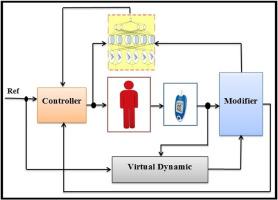Artificial intelligent pancreas for type 1 diabetic patients using adaptive type 3 fuzzy fault tolerant predictive control
IF 7.5
2区 计算机科学
Q1 AUTOMATION & CONTROL SYSTEMS
Engineering Applications of Artificial Intelligence
Pub Date : 2024-11-15
DOI:10.1016/j.engappai.2024.109627
引用次数: 0
Abstract
In this paper, the design methodology of artificial intelligent pancreas is presented. Accurate regulation of blood glucose levels in type 1 diabetic patients is of great importance in the presence of possible faults caused by sensor measurements. Regulation of blood glucose levels using a type 3 fuzzy predictive controller in type 1 diabetic patients in the presence of sensor faults is considered. The proposed structure includes a main control structure and a virtual dynamic, in which the main structure includes a fuzzy identifier, predictive controller, and an adaptive compensator, and the virtual structure is used to identify the sensor faults. Glucose is unknown in the dynamics of type 1 diabetes and is estimated on-line using a type 3 fuzzy system. Also, Lyapunov stability analysis is used to design the adaptive compensator to ensure the stability of the closed-loop system. The proposed methodology is evaluated based on Bergman’s minimum model for different patients under various parametric uncertainties and disturbances.

利用自适应 3 型模糊容错预测控制为 1 型糖尿病患者提供人工智能胰腺
本文介绍了人工智能胰腺的设计方法。在传感器测量可能出现故障的情况下,准确调节 1 型糖尿病患者的血糖水平非常重要。研究考虑了在传感器出现故障的情况下,使用 3 型模糊预测控制器调节 1 型糖尿病患者的血糖水平。所提出的结构包括一个主控制结构和一个虚拟动态结构,其中主结构包括模糊识别器、预测控制器和自适应补偿器,虚拟结构用于识别传感器故障。在 1 型糖尿病的动态过程中,葡萄糖是未知的,因此使用 3 型模糊系统进行在线估计。同时,利用 Lyapunov 稳定性分析设计自适应补偿器,以确保闭环系统的稳定性。根据伯格曼最小模型,在各种参数不确定性和干扰下对不同患者的拟议方法进行了评估。
本文章由计算机程序翻译,如有差异,请以英文原文为准。
求助全文
约1分钟内获得全文
求助全文
来源期刊

Engineering Applications of Artificial Intelligence
工程技术-工程:电子与电气
CiteScore
9.60
自引率
10.00%
发文量
505
审稿时长
68 days
期刊介绍:
Artificial Intelligence (AI) is pivotal in driving the fourth industrial revolution, witnessing remarkable advancements across various machine learning methodologies. AI techniques have become indispensable tools for practicing engineers, enabling them to tackle previously insurmountable challenges. Engineering Applications of Artificial Intelligence serves as a global platform for the swift dissemination of research elucidating the practical application of AI methods across all engineering disciplines. Submitted papers are expected to present novel aspects of AI utilized in real-world engineering applications, validated using publicly available datasets to ensure the replicability of research outcomes. Join us in exploring the transformative potential of AI in engineering.
 求助内容:
求助内容: 应助结果提醒方式:
应助结果提醒方式:


